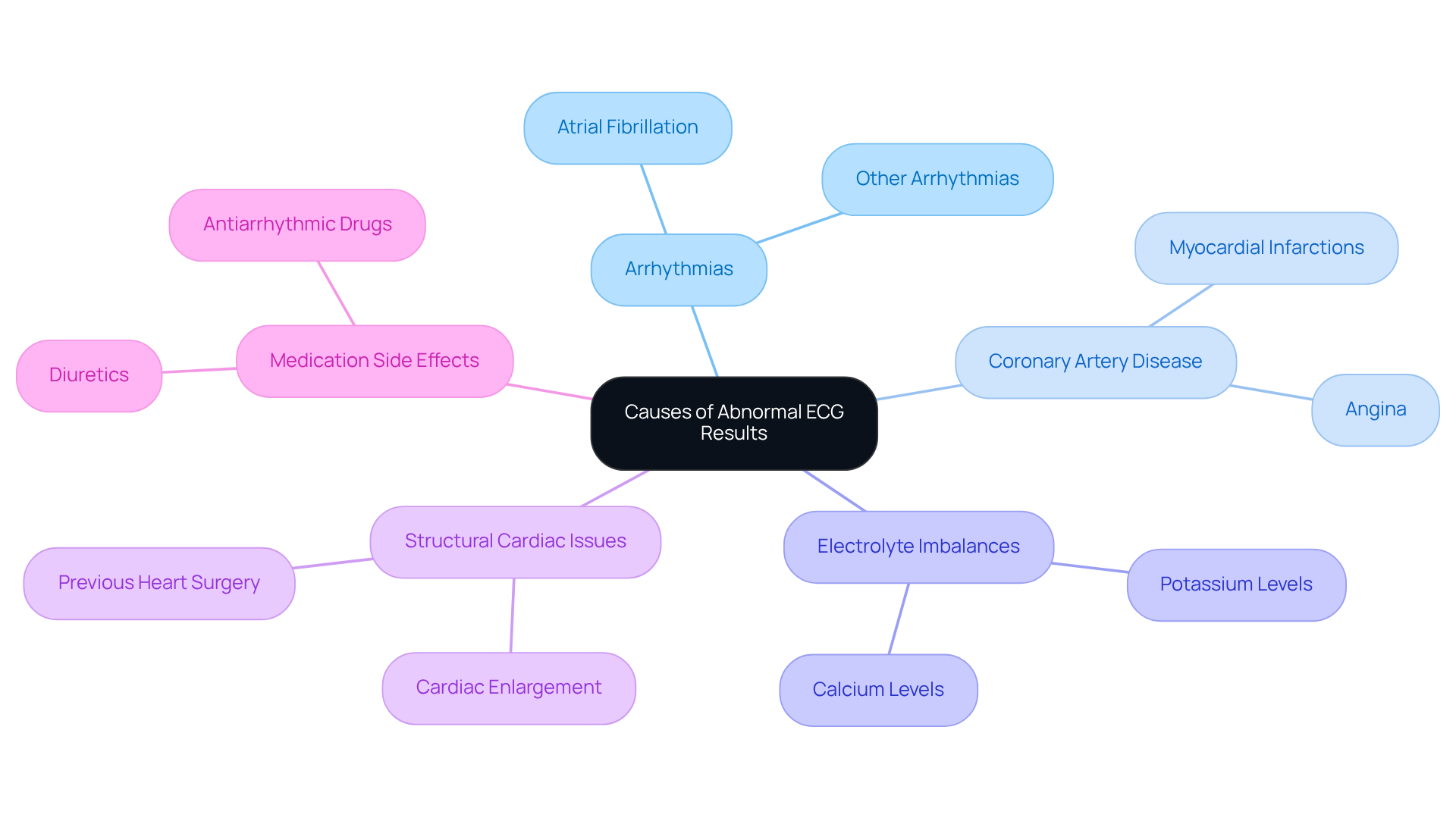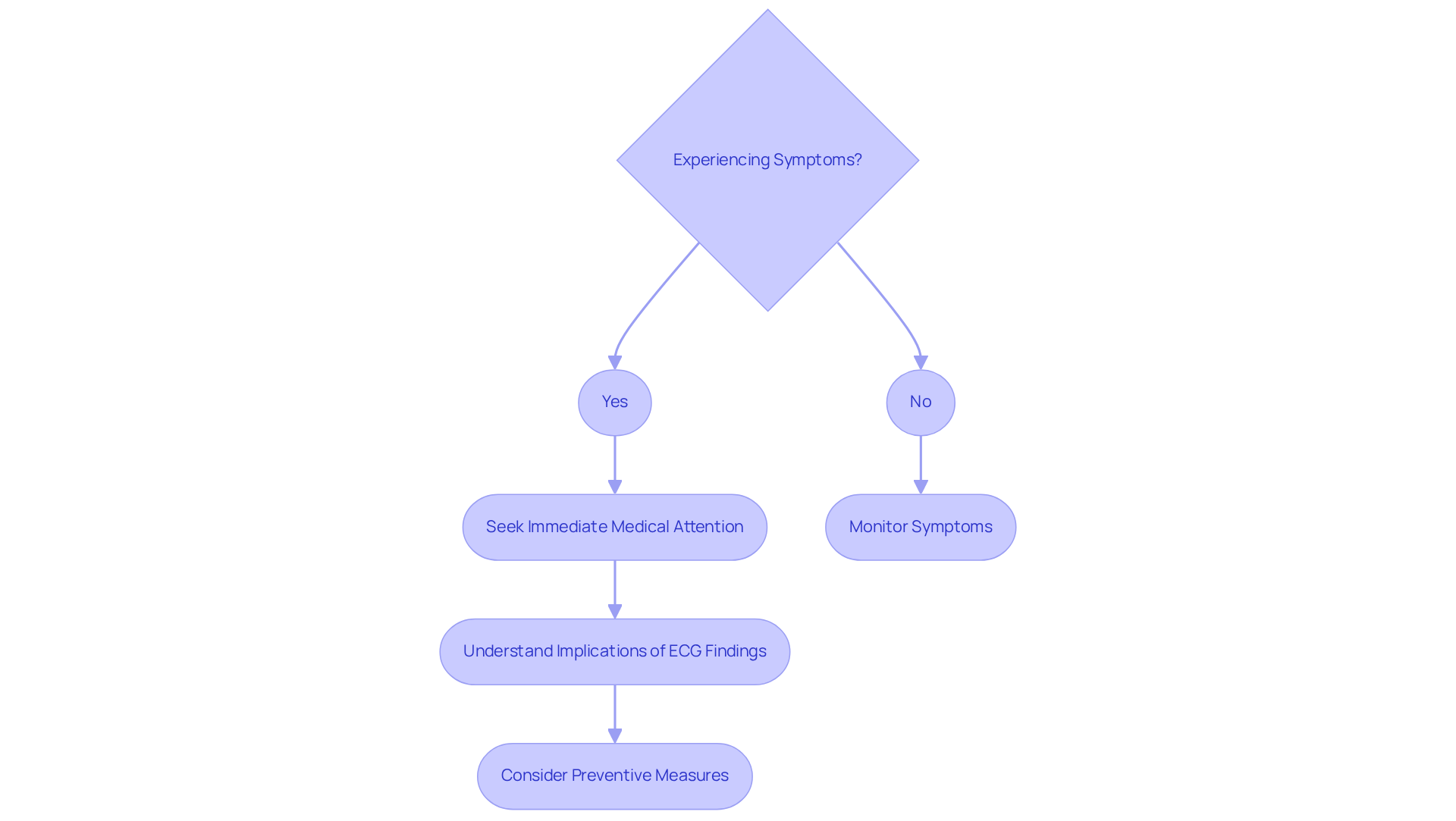


Abnormal electrocardiograms (ECGs) can be significant indicators of potential cardiovascular issues, especially for older adults. These readings may reveal serious conditions such as arrhythmias and coronary artery disease, which can understandably cause concern. It's important to recognize that regular ECG monitoring can play a crucial role in your health journey.
Understanding normal parameters and the implications of abnormal results is vital. By staying informed, you can take proactive steps towards timely medical interventions, which can lead to improved health outcomes. Remember, you are not alone in this; support is available, and seeking help can make a meaningful difference in your well-being.
If you have any questions or feelings of anxiety regarding your heart health, please don't hesitate to reach out. Your health matters, and together, we can navigate these concerns with care and compassion.
Abnormal electrocardiograms (ECGs) can often evoke feelings of anxiety, particularly as they may indicate underlying heart health issues that require attention. For many individuals, especially older adults who face an increased risk of cardiovascular complications, understanding the nuances of these readings is essential. This article explores the significance of ECGs, the implications of abnormal results, and the latest advancements in monitoring and treatment options.
How might a deeper understanding of ECGs empower you to take charge of your heart health and potentially prevent serious medical events? Together, we can navigate these concerns with care and support.
An electrocardiogram (ECG or EKG) is a non-invasive examination that records the heart's electrical activity over time, offering vital insights into its rhythm, size, and overall health. This essential diagnostic tool plays a crucial role in identifying various , such as arrhythmias and myocardial infarctions, which are particularly significant for older individuals facing an increased risk of heart issues. Regular ECG monitoring can help detect potential problems early, allowing for timely interventions that can greatly enhance outcomes and quality of life.
Recent studies show that an abnormal electrocardiogram is linked to a higher risk of serious heart events in older adults. For instance, a study involving 2,192 individuals aged 70 to 79 found that those with an abnormal electrocardiogram had a greater likelihood of experiencing heart-related complications over an eight-year period. This highlights the importance of routine ECG assessments for this demographic, ensuring they remain proactive in their heart health.
Furthermore, innovative approaches like remote ECG monitoring are emerging as promising solutions for improving diagnosis rates among older adults. The AMALFI trial, which utilized a 14-day ECG patch, revealed a modest increase in atrial fibrillation (AF) diagnoses, showcasing how technology can enhance cardiovascular care and support.
Given these findings, cardiologists emphasize the importance of understanding ECG results for older individuals. By recognizing the significance of these assessments, individuals can engage more effectively in their cardiovascular management, leading to improved outcomes and a better quality of life. If you have concerns about your heart health, consider discussing ECG monitoring with your healthcare provider; taking this step can empower you to take charge of your well-being.

Understanding typical ECG parameters is crucial for , especially as we age. A heart rate between 60 and 100 beats per minute is considered normal for adults, and knowing this can provide peace of mind. The PR interval should ideally fall between 120 and 200 milliseconds, while the QRS duration must be less than 120 milliseconds. Additionally, it's important to note that each QRS complex should be preceded by a P wave, indicating a normal sinus rhythm.
Being familiar with these parameters empowers you to recognize any deviations in your abnormal electrocardiogram. If you notice anything unusual, it’s important to consult with your healthcare provider promptly. Regular monitoring of these metrics can significantly aid in the early detection of potential cardiovascular issues, which can lead to better health outcomes. Remember, you are not alone in this journey; support is always available to help you maintain your health.

Unusual ECG results can stem from various factors, such as:
Atrial fibrillation, which is particularly common among older individuals, significantly contributes to irregular rhythms that can be detected on an ECG. Recent estimates suggest that around 10.5 million adults in the U.S. have been diagnosed with atrial fibrillation, underscoring its prevalence and the importance of awareness for everyone.
In addition to this, abnormal electrocardiogram readings can occur due to:
Understanding these factors is crucial for individuals, as it emphasizes the and necessary lifestyle changes to effectively manage cardiovascular health.
Cardiologists stress that recognizing the signs of arrhythmias can lead to timely interventions, ultimately enhancing patient outcomes. It's essential to feel empowered in your health journey, and remember, you are not alone in this. Seeking support and guidance can make a significant difference in your well-being.

Unusual ECG findings, including an abnormal electrocardiogram, can be a sign of serious health issues, such as heart attacks or severe arrhythmias. It's important for patients to be aware of symptoms like chest pain, shortness of breath, dizziness, or palpitations, as these require immediate medical attention. Did you know that approximately 805,000 people in the United States experience a cardiac event each year? This statistic highlights the critical need to recognize these warning signs. For instance, one individual who felt lightheaded and had palpitations sought help after experiencing an abnormal electrocardiogram, leading to prompt action that potentially averted a cardiac event.
Moreover, it's significant to note that about 1 in 5 cardiac events are silent, meaning many individuals may not even realize they are experiencing one. Understanding the implications of an abnormal electrocardiogram in your ECG results can empower you to take proactive steps in managing your cardiovascular health, ensuring you receive the appropriate care when needed. At Amavita Cardiovascular Health®, we are dedicated to providing thorough cardiac assessments and preventive measures designed to significantly reduce the risk of myocardial infarction.
Our approach includes advanced risk assessment tools and personalized interventions tailored to your unique condition, lifestyle, and goals. We also offer various programs, such as our Optimal Program, which features and cardiac screenings. Remember, neglecting these signs can lead to serious consequences. It is essential to respond quickly and explore our advanced cardiovascular monitoring programs, as we are here to support you every step of the way.

When faced with an , it’s natural to feel concerned. At Amavita Heart and Vascular Care®, we understand that each patient’s journey is unique, particularly for older individuals who may have complex medical needs. Our patient-centered approach focuses on you and your specific situation.
Treatment options can vary based on the underlying cause, and we offer a range of solutions tailored to your needs. These may include:
Our specialized care aims to enhance your quality of life. We are committed to creating a comprehensive treatment plan that reflects your individual circumstances. Regular follow-ups with our cardiologists will ensure that we monitor your condition closely and adjust treatments as necessary. This ongoing support not only provides peace of mind but also emphasizes our dedication to your overall health and well-being.
Remember, you are not alone in this journey. We are here to help you every step of the way, ensuring that you feel valued and cared for as we work together towards better heart health.
Understanding abnormal electrocardiograms is essential, especially as we age and face heightened risks for heart-related issues. This article underscores the importance of regular ECG monitoring, a vital tool for early detection of potential cardiovascular problems. Such proactive measures allow for timely interventions that can significantly enhance health outcomes.
Key insights discussed include:
The article emphasizes the implications of unusual ECG findings, highlighting the need for immediate medical attention when concerning symptoms arise. Additionally, it outlines treatment options tailored to individual needs, reinforcing the importance of a patient-centered approach in managing heart health.
The journey towards better cardiovascular health begins with awareness and proactive engagement. Individuals are encouraged to recognize the significance of ECG assessments and to seek guidance from healthcare providers when necessary. By taking these steps, you can empower yourself to manage your heart health effectively, ultimately leading to improved quality of life and well-being.
What is an electrocardiogram (ECG or EKG)?
An electrocardiogram (ECG or EKG) is a non-invasive examination that records the heart's electrical activity over time, providing vital insights into its rhythm, size, and overall health.
Why is ECG important for older individuals?
ECG is crucial for older individuals as it helps identify various cardiovascular conditions, such as arrhythmias and myocardial infarctions, which are significant due to the increased risk of heart issues in this demographic. Regular ECG monitoring can detect potential problems early, allowing for timely interventions.
What do recent studies indicate about abnormal ECGs in older adults?
Recent studies show that an abnormal electrocardiogram is linked to a higher risk of serious heart events in older adults. For example, a study found that individuals aged 70 to 79 with abnormal ECGs had a greater likelihood of experiencing heart-related complications over an eight-year period.
How can remote ECG monitoring benefit older adults?
Remote ECG monitoring, such as the use of a 14-day ECG patch demonstrated in the AMALFI trial, has shown a modest increase in atrial fibrillation diagnoses. This innovative approach can enhance cardiovascular care and improve diagnosis rates among older adults.
What are the normal ECG parameters to be aware of?
Normal ECG parameters include a heart rate between 60 and 100 beats per minute, a PR interval of 120 to 200 milliseconds, and a QRS duration of less than 120 milliseconds. Each QRS complex should also be preceded by a P wave, indicating a normal sinus rhythm.
What should I do if I notice deviations in my ECG results?
If you notice any unusual deviations in your ECG results, it is important to consult with your healthcare provider promptly for further evaluation and guidance.
How can understanding ECG results empower individuals?
By understanding ECG results, individuals can engage more effectively in their cardiovascular management, leading to improved outcomes and a better quality of life.